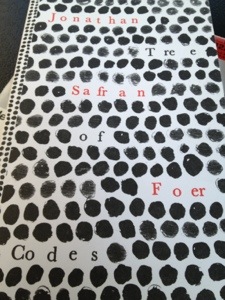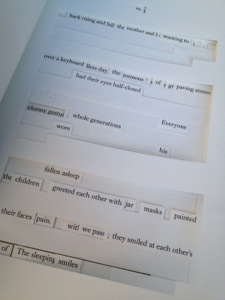
Tree of Codes by Jonathan Safran Foer
It was a birthday gift from a friend who reads this blog. Thanks, S. I liked the book very much. I also like that you get my project here. You understand me.

The book is a work of art, its narrative cut, literally, from the pages of another story, The Street of Crocodiles by Bruno Schulz.
Tree of Codes works, loosely. It is an exercise in taking away, a practice of editing. The result is a translucent tale, bordering on illegibility, that includes as it excludes.
Here are a few good lines:
– “children greeted each other with masks on their faces”
– “we passed the chemist’s large jar of pain.
-“a face from which life was walking, a pale network of lines on an old map of distant lands wandering over memories which would suddenly blow away.”
-“he became almost insane with mother.”
The story is somewhat strange and dreamlike. Reading is difficult but quick. It leaves me wondering about the rest of the story, the scraps of edits tossed on the ground in the process, not to mention the whole wide world excluded from the original text of The Street of Crocodiles.
So, have you read it? What did you think of it? If not, you should check it out.

Christi, I love this post, and I’m glad you like the book!
I agree it is a work of art, something really neat to hold in your hands in an age of Nooks and Kindles.
When looking at the reviews, I noticed that they just about always focus on the form of the book. Although the form is remarkable, I wanted to hear more about what people thought about the words. The most people tended to write about that aspect of the book is that the story doesn’t “work.” I think if you’re expecting a novel, it doesn’t work, because it’s not a novel. It’s more like a poem, or as you said, a dream of undulating images. As I read, I enjoyed the imagery, but the story did not seem very coherent to me. Somehow, though, by the end, it had moved me to tears, and I’m not really sure why. When I described the book (its content, that is) to Ryan, he commented that it sounds like it has a Buddhist theme because of the people waiting for and expecting the last day, and then ending up living in the moment when life goes on.